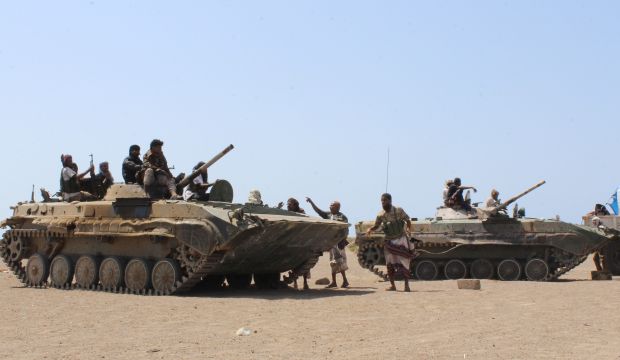
Fighters against Shi’ite rebels known as Houthis gather in the strait of Bab El-Mandeb, west of the southern port city of Aden, to take back the control of the strait, on Friday, October 2, 2015. (AP Photo/Wael Qubady)
Riyadh and Aden, Asharq Al-Awsat—The Yemeni government has decided to sever diplomatic ties with Iran over what its foreign ministry said was “a series of violations Tehran committed inside Yemeni territory.”
Yemen’s Foreign Minister Riyadh Yassin told Asharq Al-Awsat on Friday the “violations” included Iran “stirring up sedition and unrest, smuggling weapons, and supporting [insurgent] groups that mounted a coup against the [government].”
President Abd Rabbuh Mansur Hadi’s government and Arab allies accuse Iran of providing military support to the Houthis who, along with supporters of ousted ex-president Ali Abdullah Saleh, last year seized large parts of the country, including Sana’a, and forced the internationally recognized president into exile.
Saudi Arabia and nine Arab states have been bombing the Houthis in Yemen for more than six months as part of a military campaign which aims to restore Hadi to power.
Yassin said the headquarters of the Iranian embassy in Sana’a, where the Houthis are in control, “has no diplomatic immunity now,” giving mission staff a 48-hour deadline to leave the country.
Last week, Arab coalition forces seized an Iranian fishing boat in the Arabian Sea carrying weapons meant for the insurgent group in Yemen.
According to Yassin, Iran’s foiled attempt to smuggle weapons into Yemen as well as “its deputy foreign minister’s decision to walk out of the Organization of the Islamic Cooperation’s (OIC) meeting that called . . . for supporting the Yemeni legitimacy, resolved the matter of severing diplomatic ties with Tehran.”
Meanwhile, a government spokesman, Rajeh Badi, told Asharq Al-Awsat the recent military campaign that saw loyalists and Saudi-led coalition seize the strategic Bab El-Mandab Strait “will pave the way to the liberation of Taiz city and all the Red Sea coastal areas” from the Houthis.
Government forces, the spokesman said, are achieving progress on the ground and are “on their way to liberating Al-Mokha city and its strategic port west of Taiz.”
The United Nations Human Rights Council on Friday adopted a Saudi-proposed resolution that calls for the UN to provide Hadi’s government with “technical assistance” to improve the human rights situation in Yemen.
